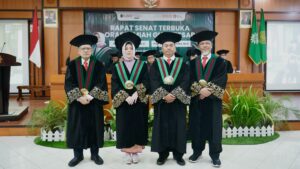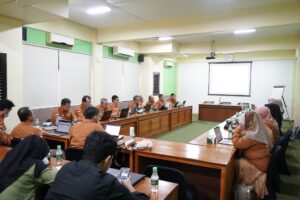Many people have not perceived yet significant impacts of ASEAN Economic community (AEC) commenced since December. However, the people should always support local products to compete with products of other Southeast Asian countries.
In a session of the 13th Nasyiatul Aisyiyah congress at Sportorium of Universitas Muhammadiyah Yogyakarta (UMY) on Saturday (27/8), President Director of SMESCO (Small and Medium Cooperatives) of Indonesia, Ahmad Zabadi, stated that love for one’s country is a part of faith as mentioned on hadits of Prophet Muhammad.
Ahmad informed that Indonesia possesses entrepreneurs that 98.7% of them are micro entrepreneurs and 0.01 % of the entrepreneurs are macro entrepreneurs. Most of the micro entrepreneurs graduated from elementary school and junior high school, and the contribution of micro business to property taxes is only 57%, while macro business contribution is 43%.
“Due to the AEC, the micro entrepreneurs have to have head to head to foreign entrepreneurs graduating from higher education. They seem as if a low-class boxer fight a high-class boxer. Besides, their products should have standards established in a country where the micro entrepreneurs would like to market their products,” Ahmad conveyed.
In fact, many Indonesian people prefer foreign products than local products. Most of them are quite unsatisfied with the quality of local products, and they argue that foreign products have high quality.
“The belief seems like despotic to the local products and helping local products. We let the local entrepreneurs fight by themselves. We have to imitated people of Republic of Korea. In the beginning of 2000, the quality of Samsung products was lower than the quality of Western products, but most of Korean capitalized on the Samsung products so that the products can be sold in international markets,” Ahmad told.
Additionally, Rector of UMY, Prof. Bambang Cipto, M.A. talked about women’s empowerment. This issue leads women to be more active to work and to engage in business and activities outside their home. Issues of women’s empowerment are effort of Western countries to overthrow economy of developing countries such as Indonesia.
“Western countries seem afraid of the great number of people of developing countries. The number of people will foster the economy. One of the ways to prevent the development is to encourage women to get out of home. As the result, women become less interested in having family or they postpone to get married,” Prof. Bambang contended.
Nevertheless, Prof. Bambang agreed that women enhance their skills and resource access is developed. “The main point is that we are aware of the ideas behind the women’s empowerment,” he emphasized.







